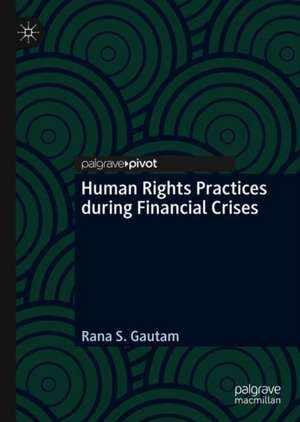Human Rights Practices during Financial Crises
Autor Rana S. Gautamen Limba Engleză Hardback – 25 ian 2019
Preț: 416.16 lei
Nou
Puncte Express: 624
Preț estimativ în valută:
79.64€ • 82.64$ • 66.57£
79.64€ • 82.64$ • 66.57£
Carte tipărită la comandă
Livrare economică 15-29 martie
Preluare comenzi: 021 569.72.76
Specificații
ISBN-13: 9783030036690
ISBN-10: 3030036693
Pagini: 113
Ilustrații: XIII, 102 p. 6 illus.
Dimensiuni: 148 x 210 mm
Greutate: 0.3 kg
Ediția:1st ed. 2019
Editura: Springer International Publishing
Colecția Palgrave Pivot
Locul publicării:Cham, Switzerland
ISBN-10: 3030036693
Pagini: 113
Ilustrații: XIII, 102 p. 6 illus.
Dimensiuni: 148 x 210 mm
Greutate: 0.3 kg
Ediția:1st ed. 2019
Editura: Springer International Publishing
Colecția Palgrave Pivot
Locul publicării:Cham, Switzerland
Cuprins
1. Introduction.- 2. A Theory of Human Rights during Recession.- 3. An Empirical Investigation of Human Rights in Recession.- 4. Conclusion.
Notă biografică
Rana S. Gautam is Assistant Professor in the Department of Sociology & Human Services at the University of North Georgia, USA. Before joining academia, he worked in the IT industry and was a journalist with an Indian daily newspaper.
Textul de pe ultima copertă
“A probing and sophisticated analysis of the relationship between ever more precarious human rights and ever more common financial crises.”
—Joel Blau, Professor Emeritus of Social Policy, Stony Brook University, USA
“The central questions Gautam studies here—which segments of society suffer the most during financial crises and why—are vital and timely. His thoughtful investigation teaches us a lot about the distributional implications of financial crises and how political institutions mitigate or magnify those implications.” —Joel Simmons, Associate Professor, Edmund A. Walsh School of Foreign Service, Georgetown University, USA
From the Great Depression in the twentieth century to the Great Recession in the twenty-first, systemic banking crises have been a recurring problem for both developing and developed countries. This book offers a human rights perspective on financial crises vis-à-vis low-income and leastdeveloped countries. It systematically analyzes government’s commitment to women’s economic rights and basic human rights during systemic banking crises. The book combines a wealth of data with rich theoretical arguments that weave together distinct but related bodies of literature from international development, human rights, and political economy.
Rana S. Gautam is Assistant Professor in the Department of Sociology & Human Services at the University of North Georgia, USA. Before joining academia, he worked in the IT industry and was a journalist with an Indian daily newspaper.
—Joel Blau, Professor Emeritus of Social Policy, Stony Brook University, USA
“The central questions Gautam studies here—which segments of society suffer the most during financial crises and why—are vital and timely. His thoughtful investigation teaches us a lot about the distributional implications of financial crises and how political institutions mitigate or magnify those implications.” —Joel Simmons, Associate Professor, Edmund A. Walsh School of Foreign Service, Georgetown University, USA
From the Great Depression in the twentieth century to the Great Recession in the twenty-first, systemic banking crises have been a recurring problem for both developing and developed countries. This book offers a human rights perspective on financial crises vis-à-vis low-income and leastdeveloped countries. It systematically analyzes government’s commitment to women’s economic rights and basic human rights during systemic banking crises. The book combines a wealth of data with rich theoretical arguments that weave together distinct but related bodies of literature from international development, human rights, and political economy.
Rana S. Gautam is Assistant Professor in the Department of Sociology & Human Services at the University of North Georgia, USA. Before joining academia, he worked in the IT industry and was a journalist with an Indian daily newspaper.
Caracteristici
Offers a human rights perspective on the topical issue of financial crisis at a time of the growing importance of human rights for development and public policy Marks the first known comparative analysis of the human rights consequences of systemic banking crisis that focuses on low-income and least developed countries Uses a wealth of data to empirically evaluate change in basic human rights and women’s economic rights practices Takes a multidisciplinary approach and speaks to a diverse audience interested in human rights, development, political economy, public policy, and social work
